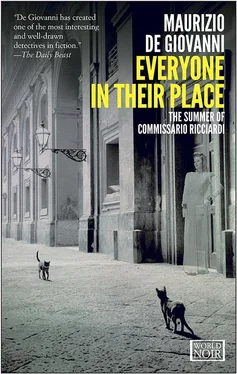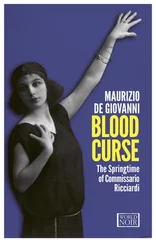Maurizio de Giovanni - Everyone in Their Place
Здесь есть возможность читать онлайн «Maurizio de Giovanni - Everyone in Their Place» весь текст электронной книги совершенно бесплатно (целиком полную версию без сокращений). В некоторых случаях можно слушать аудио, скачать через торрент в формате fb2 и присутствует краткое содержание. Жанр: Исторический детектив, Полицейский детектив, на английском языке. Описание произведения, (предисловие) а так же отзывы посетителей доступны на портале библиотеки ЛибКат.
- Название:Everyone in Their Place
- Автор:
- Жанр:
- Год:неизвестен
- ISBN:нет данных
- Рейтинг книги:4 / 5. Голосов: 1
-
Избранное:Добавить в избранное
- Отзывы:
-
Ваша оценка:
- 80
- 1
- 2
- 3
- 4
- 5
Everyone in Their Place: краткое содержание, описание и аннотация
Предлагаем к чтению аннотацию, описание, краткое содержание или предисловие (зависит от того, что написал сам автор книги «Everyone in Their Place»). Если вы не нашли необходимую информацию о книге — напишите в комментариях, мы постараемся отыскать её.
Everyone in Their Place — читать онлайн бесплатно полную книгу (весь текст) целиком
Ниже представлен текст книги, разбитый по страницам. Система сохранения места последней прочитанной страницы, позволяет с удобством читать онлайн бесплатно книгу «Everyone in Their Place», без необходимости каждый раз заново искать на чём Вы остановились. Поставьте закладку, и сможете в любой момент перейти на страницу, на которой закончили чтение.
Интервал:
Закладка:
Soundlessly, Concetta came to summon them. The young master could receive them now.
Just once, for a change, you devote yourself to yourself for a bit. You’ve washed your hair in the large washbasin of the porcelain bath accessories. You rinse your hair with the pitcher, using water that you heated in the big cook pot in the kitchen: it’s something you haven’t done in ages. Now you’re brushing it out, sitting in front of the mirror; again, something you’ve almost forgotten how to do. Lazily, you also wonder whether it’s worth the trouble of curling it with a permanent, instead of pulling it up into a bun on the back of your head, the way you always do: your hair’s not ugly after all, once it’s washed and loosened. It’s not dull anymore. There’s a new glistening light to it.
There’s a different expression in your eyes, as well; you wonder what it could be. What could be new about them. Perhaps it’s just the hint of a smile.
Perhaps you want to be ready when the time comes.
The staircase was cool due to the thickness of the palazzo’s outer walls. As they climbed, Maione, who was still panting and sweating, directed a question to Concetta’s vast back:
“But with all the empty rooms in the building, why on earth did the young master choose to go live on the top floor?”
Concetta replied without raising her voice, as if she were in a church.
“The young master moved upstairs after his mother’s death, ten years ago. He loves plants, he keeps them on the terrace; so he wants to be close to them. Also, it’s comfortable for him, he has two large rooms.”
Ricciardi broke in to ask:
“Is there no direct access, from his apartment to the second story? Is it absolutely necessary to take the stairs?”
“Yes, you absolutely have to take the stairs.”
They’d reached a landing, with a small wooden door. Maione asked:
“And who lives there?”
Before Concetta had time to answer, the wooden door swung open and a boy looked out. His resemblance to Mariuccia, the housemaid, was unmistakable. In one hand he held a book, in the other, a chunk of bread and tomato.
Glaring venomously at the snack, Maione answered his own question.
“Why did I even ask? The Sciarra family. You must be the eldest, no?”
The boy, intimidated by the uniform, nodded his head yes. He resembled his mother so distinctly that Maione practically expected him to start sobbing at any moment.
“Yessir, Vincenzo Sciarra, at your service. I’m going to the after-school tutoring session.”
“Well, then get going. But don’t your jaws get tired, chewing all the time like that? Go on, don’t just stand there.”
The boy took off, while Ricciardi looked at the brigadier and shook his head.
“This fasting you’re doing isn’t good for you: you’re becoming intractable.”
Gosh, thought Maione. By those standards, the commissario’s been on a fast since the day he was born.
They’d now come to a large ornamentally carved door, a few steps higher up.
Concetta, who had gone in to announce their arrival in the meanwhile, came back out.
“If you please, go right on in. It’s the door at the far end of the first room. I’ll wait for you downstairs.”
They walked through a large messy room, a cross between a drawing room and a library. There was an imposing desk piled high with books, both open and closed, with sheets of paper scattered across it, covered with a close, slanted script; one wall was covered, floor to ceiling, with a bookcase made of dark wood, overflowing with books; there were two armchairs, and between them a small table on which sat a trumpet gramophone, while on the floor lay several 78 RPM disks. On another low table sat a bottle of liquor, with a few dirty glasses.
The impression was of a place where one or more persons lived every minute of the day, working, relaxing, and resting; and where someone who might tidy up was only rarely admitted. Light and an intense scent of flowers came in through a set of French doors, half open, along with the sound of someone whistling.
Ricciardi and Maione exchanged a glance and then headed toward the half-open door. The brigadier called out, asking leave to come in:
“ È permesso ?”
The whistling stopped and a low, musical voice said: “ Prego , come right ahead. I’m out here, on the terrace.”
The setting was somewhat surprising. The light of the sun, at its zenith at that time of the day, was filtered through plants of every kind: the only thing missing was trees, even though some of the climbing vines had trunks of considerable size. Ricciardi was no botanist but he had grown up in the country, in regular contact with fields, orchards, and gardens, and he understood the attention and the immense love required to create that only apparently wild tangle of plants. Whoever cared for that open-air greenhouse had to devote a great deal of time to its cultivation, along with considerable enthusiasm.
From one corner a young man of pleasing appearance, about thirty, came toward them. He wore a white shirt with the sleeves rolled up onto his forearms; he was slender, with a dark complexion, and a hooked nose and a thin mustache. His black hair, parted in the middle, was wavy and neatly brushed. With a frank and open smile, he extended his hand.
“A pleasure. I’m Ettore Musso.”
“The pleasure is all ours, Signor Duca. I’m Brigadier Maione from Naples police headquarters, and this is my commanding officer, Commissario Ricciardi. Our sincerest condolences for your loss.”
The man looked at him vaguely, as if he hadn’t quite understood what Maione had just said. Then he burst out laughing.
“That’s rich! No, forgive me, gentlemen, but that’s truly rich. For my loss, did you say? Condolences?”
Maione stared at Ricciardi, nonplussed. The commissario, on the other hand, was looking at Ettore; his expression hadn’t altered. When he’d finished laughing, the man went on:
“Excuse me. I really am unforgivable. Please, make yourselves comfortable. Would you like something to drink? Or to eat, perhaps?”
He sat down on a wrought-iron chair, which stood with two other chairs like it around a small tile-top table. At the center of the table was a carafe of coffee and a dish of sweet rolls and a bowl of marmalade. With an apologetic air he added:
“I’m breakfasting late. I’m afraid I was up until very late last night; I’ve only just woken up. Now what can I do for you?”
The two policemen sat down. The man’s manner was certainly charming and the setting was pleasant. The plants, recently watered, provided shade and humidity, making it pleasantly cool. The corner with the table was free of buzzing insects, which could however be heard everywhere else on the terrace. Guessing what Ricciardi was thinking, Ettore said:
“Bravo, Commissario. So you noticed, eh? If you don’t want insects around you, you need only choose wisely when it comes to picking the plants you put near you. You must above all avoid flowers: they’re lovely to look at from a distance, too, and the scent will reach you just the same.”
While he was speaking he’d taken a roll, spread marmalade on it, and now he was nibbling at it eagerly. Maione felt his instinctive liking for Ettore melt away.
Ricciardi finally spoke:
“May I ask you to explain why you laughed, Duke? I failed to grasp what was funny about what the brigadier said. That may just be because I don’t have much of a sense of humor.”
Ettore stopped, then he laughed again, scattering bits of bread all over the table.
“No, forgive me again. The reason is quite simple: the death of my. . of my father’s wife is perhaps the best piece of news I’ve received in the last several years. And so it struck me as ridiculous to have you offer your condolences, that’s all.”
Читать дальшеИнтервал:
Закладка:
Похожие книги на «Everyone in Their Place»
Представляем Вашему вниманию похожие книги на «Everyone in Their Place» списком для выбора. Мы отобрали схожую по названию и смыслу литературу в надежде предоставить читателям больше вариантов отыскать новые, интересные, ещё непрочитанные произведения.
Обсуждение, отзывы о книге «Everyone in Their Place» и просто собственные мнения читателей. Оставьте ваши комментарии, напишите, что Вы думаете о произведении, его смысле или главных героях. Укажите что конкретно понравилось, а что нет, и почему Вы так считаете.












